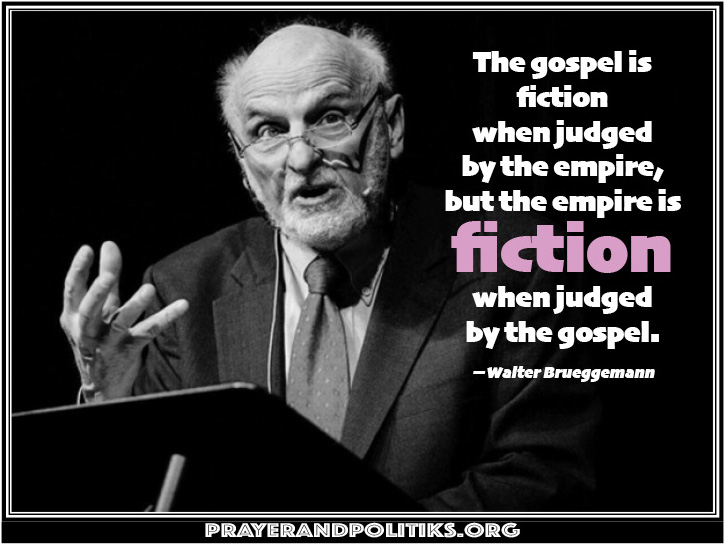Ken Sehested
There’s never an appropriate time to die. But if there was, Walter Brueggemann’s passing was well timed: In the last week of Eastertide (he was an Easter man if ever there were one, though never out of sight of the crucifixion) and days before Pentecost’s outburst. I can imagine the Heavenly chorale jumping the gun just a bit to offer an exuberant rendition of Jerry Lee Lewis’ “Great Balls of Fire” as Brueggemann passed through the Pearly Gates:
“You shake my nerves and you rattle my brain / Too much love drives a man insane / You broke my will but what a thrill / Goodness gracious, great balls of fire.”
A noted biblical scholar who could footnote with the best of them, he was also, in my opinion, the leading readable theologian for the Little Flock of Jesus who knows itself to be in exile amid the empire—but in an exile where liberation plans are surreptitiously passed from house to house, water well to market stall, whispered in Caesar’s sanctuary. Never trivializing the threat stalking the land, he nevertheless kept us eyes-forward to a larger horizon where death itself was to come undone.
Like many, his book The Prophetic Imagination was a before-and-after marker in my spiritual formation. Later, his short book, Living Toward a Vision: Biblical Reflections on Shalom” (later reissued as Peace: Living Toward a Vision) was the book that made me realize for our called-out role, “peacemaker” is a better word than discipleship, because of its comprehensive mandate to transform every arena of life, from the most workaday circumstances to the most ambitious and global.
One year I was lucky enough to take his course on the Psalms, offered at Columbia Theological Seminary in Decatur, Ga., where he taught for many years. He began every class with a prayer. I have never in my life felt more certain that I was listening to a person actually talking to God that very moment. The class also brought my attention to what I later realized was the most neglected theme in Christian liturgies and prayers: the urgent need to create space for lament.
His book Sabbath As Resistance provided me with a whole new framework for thinking about sabbath, particularly as a counter-practice to racism, consumerism, militarism, and nationalism.
When I put together a collection of litanies, prayers, and poems I’d written, in hopes of finding a publisher, I marshaled all the hutzpah I could muster and asked him if he would be willing to write an introduction. To my utter shock, he agreed.
He was generous to a fault with his time, all the while managing to write dozens of books and unnumbered essays and book reviews. And he stayed in touch with the news. I wrote him notes occasionally, once remarking on the dust I’d stirred after writing an article on Israel/Palestine. He responded by saying how he had become persona non grata at a number of institutions after his Chosen?: Reading the Bible Amid the Israeli-Palestinian Conflict.
I have dozens of his quotes in my file, and a shelf full of heavily highlighted books of his. Maybe my favorite, most concise sentence from him is: “The gospel is fiction when judged by the empire, but the empire is fiction when judged by the gospel.” His constant theme was that our true doxology is not dissipated in the sanctuary but animated into the heart of a world that has lost its way; that those of us on the Jesus Road are called out—not for conquest or privilege but for truth-telling, standing alongside the belittled and the besmirched, getting up in the faces of the exploiters, pestering them for however long it takes. And standing firm against the repercussions, which are sure to come.
I can imagine Brueggemann asking Jerry Lee Lewis for a private concert, with red Pentecost streamers flying in the wind and actual flaming tongues darting about and festal joy erupting in the aisles. And then he suddenly hits the pause button, turns around, cupping his hands around his mouth and, with an indomitable voice repeating the psalmist’s assurance to those of us earth-bound, struggling exiles: “weeping endures for the night, but joy comes in the morning.”
5 June 2025, on the date of Walter Brueggemann’s passing
# # #


